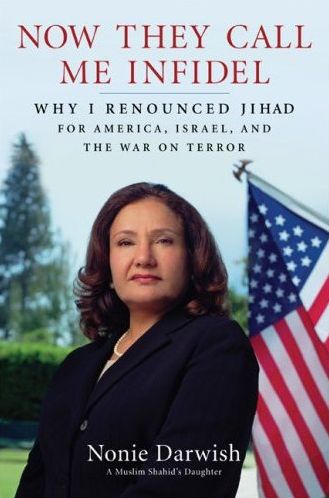Edward Gibbon, perhaps the preeminent historian of the second millennium, in his Decline and Fall of the Roman Empire, wrote that Mohammed had “no more than 17 wives: 11 enumerated and who occupied at Medina their separate apartments round the house of the apostle, and enjoyed in their turns the favor of his conjugal society.”
For the practicing Muslim, the life of Mohammad cannot be judged. His is the life by which all others are judged. Islamic societies from the Atlantic to Indonesia are rife with polygamy, plagued by honor killings, and full of other forms of cruelty to females. Finally now, almost six years after 9/11, more and more Islamic woman such as Nonie Darwish, author of Now They Call Me Infidel, are emerging as the allies of Judeo-Christendom and are kindred combatants in the war against a nihilistic Islam.
Born to a senior intelligence officer in Abdul Nasser’s military of the 1950s, Ms. Darwish makes a compelling case that in lands such as Egypt, where Islam dominates, underclass inhabitants such as Coptic Christians, Orthodox Christians, Monophysites, Zoroastrians, Hindus, Buddhists, and, of course, Jews continue to be brutalized, but none more so than Islamic women. Her book is a blistering indictment of a misogynistic polygamous world of the supposedly moderate Egyptian society.
Islamic Education
In 1955, when she was a little girl, Ms. Darwish and her family moved from Cairo to Gaza, where her father was promoted to secretly head a Palestinian fedayeen movement that was tasked with launching overt and covert operations inside Israel aimed to “cause as much death and destruction as possible.” While a child attending an Egyptian grammar school in Gaza, Darwish observed that “the hatred of Israel and our obligation to pursue jihad was somehow worked into every subject we discussed in school….Peace was never discussed as an option….With tears running down their cheeks, older girls whom I admired would stand in front of the class and recite stirring poems pledging jihad … declaring their willingness to give up their lives and promising to kill the Jewish enemies of God.”
Those who might still be clinging to the belief that all civilizations merit equal respect could be dubious at the author’s assertion that her education was no different from anywhere else in the Arab world and vexed by her assertion that Arab children are universally taught that Jews are hated by God and should be exterminated.
A year after her family moved to Gaza, Darwish’s father was killed by the Israelis with a package bomb sent to him in his office. Her four-year-old brother was in the same building and also hurt when the package detonated. For the author’s family, what added to their grief was her mother’s complete isolation. Since sharia law allows men up to four wives, none of her former friends could countenance the risk of tempting their husbands with the company of a beautiful, young, needy widow. Her mother’s experience points to only one of the many destructive aspects of the culture of polygamy.
The reader learns that it also produces vast numbers of jihadists and recruits for suicide missions. The hopeless, seething “Arab Street” is made up of poor men who live in a society of extreme sexual repression and who have no future and no chance of marrying and producing a family, because women of their caste would much prefer being the second wife of a wealthier older man to life with a poor potential wife beater.
I spoke to Nonie Darwish on the day she returned from speaking at the Summit on Secular Islam held in St. Petersburg, Fla. Bret Stevens of the Wall Street Journal, who covered the event, explained that the presenters were either ex-Muslims or reform-minded Muslims. There were no “moderates,” a term Stevens points has become “remarkably elastic,” referring to people who claim to denounce terrorism but deny that their religion has anything to do with it. A significant portion of the presenters were women and distressingly a large segment of them now live in hiding or have near full-time police protection.
I asked Ms. Darwish, as an “American militant” waging psychological warfare against religious zealots of her former faith, if she would comment on the progress of the war generally, and, given the predictions of our demise, whether she believes that the West is now winning or losing the war against militant Islam.
Darwish told me: “I think we can win. But so much action is required, and we’re still not even united. Our own press criticizes us if we try to save the Muslims of Bosnia or Afghanistan or Iraq. They call us occupiers. If we do nothing but give aid or buy the oil, then we are bad for supporting corrupt Middle Eastern dictators. Americans should all be proud of their country’s foreign policy. We have nothing to be ashamed of.”
Concerning the approaching crisis with Iran, does she see how women from inside and outside the Islamic world can play a decisive role in defeating jihadism?
“Yes,” she said, “the revolt
Increasingly, the Islamic world is hearing from its own women who are standing up to the Islamic power apparatus and to the imposition of sharia law worldwide. The Syrian-born psychiatrist Wafa Sultan, who debated a Sunni cleric on al-Jazeera, was given an award at the conference. In accepting her award, she simply said, “I don’t believe there is any difference between radical Islam and regular Islam.” The televised clip of her debate has been downloaded on YouTube more than one million times.
Ms. Darwish was recently interviewed on al Arabiya television, which resulted in her receiving hundreds of positive messages from Islamic viewers to her website, ArabsforIsrael.com. But alarmingly, the state-owned, largest Egyptian newspaper, Al Ahram, followed her interview with a front-page story about Darwish, including her picture and headline —“TRAITOR.” The editors had to know this story was a threat to her safety.
At the conference, an Iranian expatriate, Manda Ervin, joined the author in conducting a session titled “Muslim Women and Children.” In their session, they argued that training children to hate the infidel and to glory in jihad is not only endemic to Islam but is a form of child abuse. Ms. Ervin works with families inside Iran to publicize the plight of their daughters who are imprisoned and awaiting execution. Sadly, Ms. Ervin presented the audience with a list of eight girls who had recently been killed, publicly hung or stoned to death. She told me that in Tehran the regime has just captured 51 girls for the crime of assembling outside the Ministry of Justice and that it is executing one young girl a week.
Nonie Darwish’s book is subtitled “Why I renounced Jihad for America, Israel, and the War on Terror.” It is the vivid account of her journey from the world of Egyptian privilege to an American combatant in the War on Terror and can stand among the growing list of anti-Islamic polemics, filled with incidents and reflections that reveal the pathologies plaguing the Muslim psyche.
There is one incident I thought contained such an enormous irony that it could be central to the plot of a modern adaptation of Greek tragedy. Years after Darwish had moved to the U.S., her brother returned to Gaza on business. There he suffered a massive stroke and was given a 3% chance of survival. Officials at the Egyptian consulate in Gaza voted unanimously to send him to the Hadassah Hospital in Israel where Jewish doctors and nurses performed a miracle in saving his life. The incident, writes Ms. Darwish, proved one startling fact: Despite their obsessive hatred of Jews, in times of crisis, Arabs trust Jews. This was an insight upon which we Westerners might invest some hope.
NOTE: Publication: Human Events





